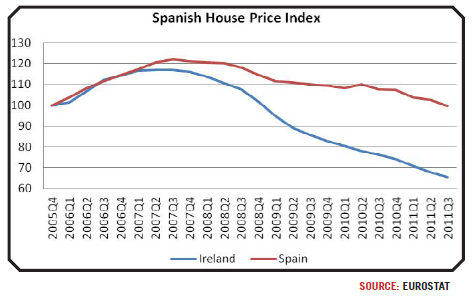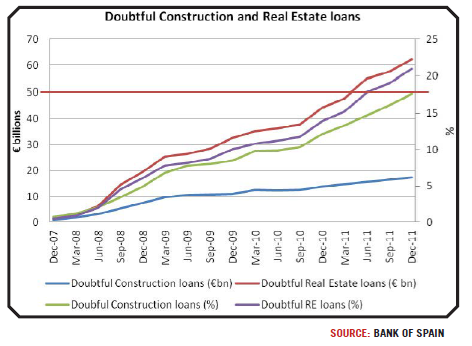Spain in the Debt Crisis Crosshairs
Politics / Eurozone Debt Crisis Apr 13, 2012 - 06:24 AM GMTBy: William_Bancroft
 Only weeks ago Italian technocrat Prime Minister Mario Monti proselytized that the Eurozone crisis was “almost over”. It felt like more propaganda from the European establishment, and since returning from the Easter break the markets don’t seem to be agreeing with him. Spanish and Italian yields are firmly on the rise again, marking a reverse of the trend helped into action by €1bn of refinancing money from the ECB. Tensions are rising once more given that Spain and Italy are ‘too big to bail’
Only weeks ago Italian technocrat Prime Minister Mario Monti proselytized that the Eurozone crisis was “almost over”. It felt like more propaganda from the European establishment, and since returning from the Easter break the markets don’t seem to be agreeing with him. Spanish and Italian yields are firmly on the rise again, marking a reverse of the trend helped into action by €1bn of refinancing money from the ECB. Tensions are rising once more given that Spain and Italy are ‘too big to bail’
We’ve touched on Italy before in these pages; her lack of competitiveness, and her long term debt accumulation antics. Although some facts about Spain’s plight have become pub and dinner party conversation, >22% unemployed and >50% youth unemployment, Spain is increasingly unable to escape investors’ attention. Spanish 10-year bond yields hit 6% yesterday. Without more LTRO from the ECB the march to the psychologically crucial 7% mark looks likely.
Spanish Prime Minister Mariano Rajoy postures as desperately trying to cut his deficit, but his efforts lack credibility. The political classes are in a bind; too used to over promising to voters who expect too much. In the words of Jean Claude Juncker: “We all know what to do, we just don’t know how to get re-elected after we‘ve done it.
Two key issues for Spain
In his excellent newsletter, Things That Make You Go Hmmm, Grant Williams gets to the core of the focus on Spain:
Spain’s real problems lie in the reality of her published government debt numbers and at the heart of her banking system. It is in these two places that any clues lie as to her chances of upsetting ‘Recovery’ on its dash for the line.Analysts are aware of Spain’s ‘Hidden Debt’ problem, but are concerned with how difficult to gauge the extent of it is. Estimates range from a further €20 – €50bn of Hidden Debt that should be added to Spain’s reported national debt figure of €915bn.
The Hidden Debt gremlins emerged when newly elected members of Mr Rajoy’s administration arrived at their localities and found the finances revealed greater excesses than had been reported. As the New York Times (NYT) reports, in Catalonia regional debt had been thought to be 2% of GDP during the 2010 elections, but recent experience suggests the figure to be 3.8%. Investors worry the bad news is not over, and perceive a range of local fiefdoms out of control. It all feels rather Greek.
Spanish property bubble an even bigger problem
Beyond this, Spain’s banking system is still of great concern. Spain’s central bank governor, Miguel Angel Fernandez Ordonez, returned to the air on April the 10th to advise that Spanish banks will need more capital if the economy continues to weaken. Weaken it looks likely to do. The Spanish property bubble was truly epic, as was the bank lending around it, yet this bubble has not properly deflated yet.

Grant Williams refers us to Open Europe and their recent report on the Spanish banking system. Open Europe describe it thus:
On the surface the lower reduction in house prices may seem positive for Spain, but the decline picked up substantially at the end of last year (annual fall of 11.2%). The massive oversupply of housing and collapse in demand, means prices have much further to fall (in Spain). In all likelihood, given the similar situation, house prices will have to fall as far as they did in Ireland, that is, another 35%. Due to the greater flexibility in wage costs and output costs in Ireland (thanks to its flexible labour market and open economy), the sector was able to adjust after the bust much more quickly than in Spain. A similar adjustment must and will take place in Spain but due to wage stickiness.
Inadequate provision for bad property loans
This could spell trouble for the property loans extended by Spanish banks during the boom. Analysts estimate that between 10% and 30% of the €400bn plus in loans outstanding are either in default, or are increasingly likely to default. Spanish banks, already short on capital, have this potential future looming over them. The banks are unable to set aside capital as provision against these actual and potential bad loans. Hence Senor Fernandez Ordonez’s comments about further support to his banking sector. Open Europe shine more light on the issue:
Taken together, there are currently €80bn in doubtful loans to the real estate and construction sectors – equal to 20% of all loans to these sectors. This results from around a 20% fall in real estate prices. If a further 35% decrease is still to come, things could get a lot worse. Proportionately, we could expect the number of doubtful loans to double. In any case, with further falls in prices many of these currently doubtful loans will default while an even larger share will become viewed as uncertain.
This means that the €50bn (shown by thin red line on graph, below) that the government recently ordered banks to put aside to cover potential losses is far from adequate. The current provisions cover only 37% of total doubtful loans and 62.5% of doubtful loans to the construction and real estate sectors. This seems inadequate even in the current position, but will be woefully short if the conditions worsen.
The future for Spain
Spain is in trouble. It is subject to continued and increasing scrutiny as the sovereign competes with the likes of Italy for a limited availability of credit. Bloomberg reports the fading effect of LTRO and that reality is returning to the Spanish and Italian bond markets as private investors alone are unwilling to provide sufficient credit.
In his blog, Gonzalo Lira lays out a compelling case for Spain having to exit the euro in the medium term. Mr Lira reflects that GDP is shrinking, unemployment figures are shocking and will rise in 2012, total government debt is rising by 10% odd a year and looks set to hit 90% of GDP this year, private debt adds a further 75% to GDP, the Spanish banks have a potential capital shortfall of almost €80bn, but most worrying is Spain’s debt repayment schedule. This year the average maturity of Spanish debt will fall from 6.4 years to 6.2 years, whilst interest payment burdens also increase. Throughout 2011 Spanish interest payments were €28.8bn, up from €22.1bn in 2010.
Spain has fallen into the classic “borrowed-short-but-my-income-is-long-and-on-top-of-that-my-loans-are-getting-more-expensive” trap.Not a pretty picture. Spain is struggling to issue debt at the rate it needs to keep financing itself. Spain barely found enough demand to complete its April the 4th bond issuance, and as Mr Lira points out the country will need to keep issuing on average every two weeks going forward. This one instance does not make a trend, but demand amongst private investors does not look sufficient to fund Spain to the tune of €186 billion in 2012.
Politics inside and outside Spain
Gonzalo Lira takes the view that the Troika will not save Spain, or at least not make efforts early enough to do so. He advises that the Germans will not fire up the printing presses in time but dither until it is too late, and that Germany is trying to string the issue out until the last minute before a dramatic late minute ‘save’. Mr Lira doesn’t see a late minute rescue being enough given Spain’s far larger size and importance than Greece.
Only the future will show whether this is the case, but significant moves to save Spain aren’t appearing yet.
Perhaps politics inside Spain are different to those of the Greek tragedy?
Prime Minister Rajoy has appointed a Spanish technocrat, Luís de Guindos, to run the national finances. According to some analysts, including the aforementioned Mr Lira, this marks a crucial difference between the Spanish and Greek situations. These analysts argue that de Guindos and Rajoy, are not ‘europhile-technocrat-insiders’ like the super Mario brothers, Monti and Draghi, and Lucas Papademos. They are proud Spaniards running a country that has never been at the centre of Europe. They have less to lose from the unmentionable word; exit.
A new Peseta
When faced with growing domestic unrest, shrinking political popularity, and an austerity enforcing but slow moving and ‘foreign’ Troika, these Spanish politicians may only be able to manage within the confines of the currency union for so long. A run of a few failed bond auctions combined with no forthcoming bailout money and rescue, could tip the scales and make exiting the Euro a desirable or necessary thing for Spanish interests.
‘Don’t blame it on me! Blame it on the euro!’ will be Rajoy’s slogan—and his people will believe him. In fact they will get fully behind him, regardless of the short-term (12-18 month) pain. – Gonzalo Lira We mentioned before the worrying amount of debt to issue in Europe this year. In a debt crisis, as always, ‘you are fine until you’re not’. The pressure is building and kicking the can cannot defer the inevitable forever. An ECB QE fiesta is not expected, whilst prediction market, InTrade, at the time of writing shows an 18% chance for ‘Spain to receive an EU/IMF bailout of more than €50bn before midnight ET 31 Dec 2012’. We’re betting with the InTrade market here, and that at some point the political leadership of one of the PIIGS will find exit more favourable than the Euro’s straightjacket. Over to you Senor Rajoy.
Worried about debt mountains, money printing and crashes? Invest in gold, and act as your own central bank…
Will Bancroft
For The Real Asset Company.
Aside from being Co-Founder and COO, Will regularly contributes to The Real Asset Company’s Research Desk. His passion for politics, philosophy and economics led him to develop a keen interest in Austrian economics, gold and silver. Will holds a BSc Econ Politics from Cardiff University.
© 2012 Copyright Will Bancroft - All Rights Reserved
Disclaimer: The above is a matter of opinion provided for general information purposes only and is not intended as investment advice. Information and analysis above are derived from sources and utilising methods believed to be reliable, but we cannot accept responsibility for any losses you may incur as a result of this analysis. Individuals should consult with their personal financial advisors.
© 2005-2022 http://www.MarketOracle.co.uk - The Market Oracle is a FREE Daily Financial Markets Analysis & Forecasting online publication.




